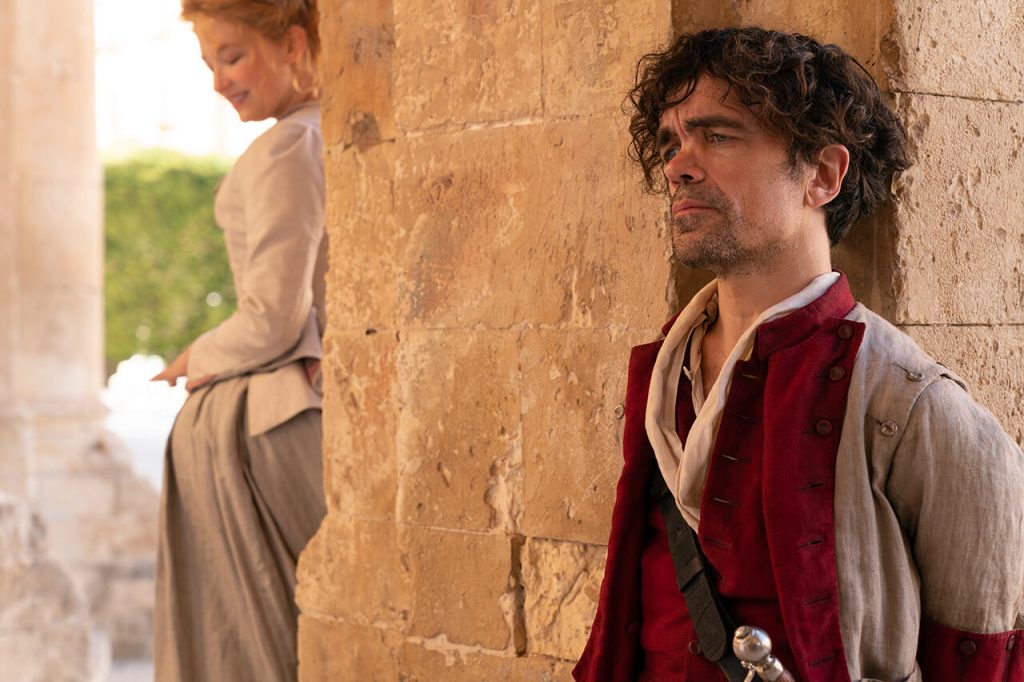Review: “Cyrano” is a vulnerable yet off-key musical fantasy
Review: Joe Wright's "Cyrano" is a vulnerable yet off-key fantasy
The official trailer for "Cyrano."
Cyrano, based on screenwriter Erica Schmidt’s 2018 stage musical, is the latest adaptation of the play Cyrano de Bergerac by Edmond Rostand. The story follows titular Cyrano, known for his wit, swordsmanship and bulbous nose, and his entanglement in a tragic love triangle.
Peter Dinklage steps into the titular role, anchoring the film with charisma and aching vulnerability. Dinklage’s dwarfism replaces an exaggerated nose as Cyrano’s perceived flaw, with pride remaining Cyrano’s true downfall.
Schmidt’s screenplay, which seamlessly weaves everyday speech with luscious prose, soars with Dinklage. His deep voice imbues each word with meaning; every syllable under his command serves the story. Schmidt and Dinklage also understand that in this story about the language of love, much is left unspoken. Schmidt leaves space between the lines for the underlying story to unfold, and Dinklage zeroes in on the complex inner life. He wears Cyrano’s heartache on his skin.

Cyrano silently loves his beautiful friend Roxanne who loves the handsome soldier Christian, who is naturally in Cyrano’s regiment. Roxanne, played by a radiant Haley Bennett, wants intense, fairytale-like romance in the form of letters. However, Christian, a charming Kelvin Harrison Jr., is inarticulate. Cyrano sees a solution–he’ll write the letters for Christian. This way, Cyrano’s words get a handsome face and Christian and Roxanne get each other. What could possibly go wrong?
The sweeping lyricism of the screenplay did not successfully translate to the film’s music. The folk-rock score, written by Aaron and Bryce Dessner of The National, struggles to find harmony with the surrounding fantasy. A character sings in a musical because their overwhelming feelings can only release through song. The unassuming melody lets the often repetitive lyrics take center stage.
The music was anti-climactic compared to the rich language preceding it, flattening the artfully crafted emotional landscape. Songs begin to sound like echoes of one another. There are flashes of harmony in “Every Letter,” where the music and sinuous staging reach a sensual crescendo of desire, and “Wherever I Fall,” a eulogy to lost chances and unspoken goodbyes sung by a trio of unnamed soldiers before marching to their impending death in the Franco-Spanish War. Cyrano’s songs were among the weakest, which is disappointing given Dinklage’s tender performance.

Director Joe Wright (Atonement, Pride & Prejudice) dives headfirst into the sonorous script. The 17th century Parisian streets are swept up in a dreamy cloud accented by the golden light of Sicily, where cinematographer Seamus McGarvey shot the film. Roxanne floats in a swirl of pastel chiffon designed by Jacqueline Durran; Massimo Cantini Parrini is responsible for the rest of the sumptuous, Academy Award nominated costumes. Choreographer Sidi Larbi Cherkaoui’s emotive dances and Wright’s theatrical flourishes, like Roxanne’s bedroom curtain caressing her as she walks into a tornado of love letters, balance well with Wright’s eye for creating intimate frames.
Wright’s direction shines strongest in the famous balcony scene. Shielded by darkness, Cyrano speaks of his love in a full-voiced duet with balcony-bound Roxanne, who thinks her love Christian’s voice simply dropped an octave in his passion. Wright’s careful framing allows three heart-wrenching tales to simultaneously unfold. The camera stays just far enough back to capture the trio, interspersing with cuts from Cyrano’s crumpled brow to Roxanne and Christian’s glowing smiles in a dance of pain and love, dark and light, despair and hope. In this moment, Wright exposes Cyrano’s longing torment; Christian’s slow realization; and Roxanne’s misguided, feverish adoration. Their tragedy is raw, roiling at the surface and waiting to consume them all.





